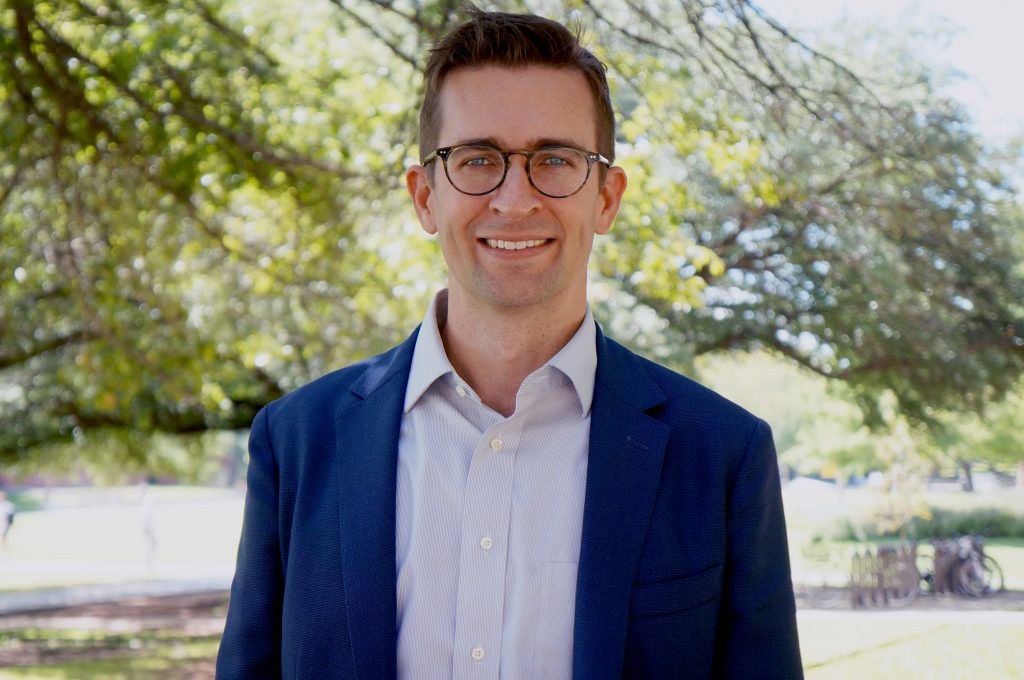Assistant Research Professor of Theology
Project Manager, Global Flourishing Study
Alex_Fogleman@baylor.edu
View / Download Curriculum Vitae
Academia Webpage
Global Flourishing Study
Catechesis Institute
 Alex Fogleman is Assistant Research Professor of Theology at ISR, where he also serves as the Project Manager for the Global Flourishing Study. He holds a PhD in Patristics and Historical Theology from Baylor University, an MDiv from Regent College (Vancouver, BC), and a BS from North Carolina State University. His areas of research include Latin and Greek patristic theology, the history of catechesis, the thought and legacy of St. Augustine, and theological accounts of human flourishing. His academic research has appeared in the International Journal of Systematic Theology, Scottish Journal of Theology,Harvard Theological Review, Church History, Journal of Early Christian Studies, Pro Ecclesia, Studia Patristica, and Augustinian Studies, among others. He is the author of the forthcoming book, Knowledge, Faith, and Early Christian Initiation with Cambridge University Press, and is currently working on two others: an introduction to the history, theology, and practice of Christian teaching catechesis; and a theological retrieval of the writings of Augustine of Hippo and Gregory of Nyssa in dialogue with social scientific research on human flourishing. Outside of ISR, he directs the Catechesis Institute and is a regular sessional lecturer at Regent College and Trinity School for Ministry.
Alex Fogleman is Assistant Research Professor of Theology at ISR, where he also serves as the Project Manager for the Global Flourishing Study. He holds a PhD in Patristics and Historical Theology from Baylor University, an MDiv from Regent College (Vancouver, BC), and a BS from North Carolina State University. His areas of research include Latin and Greek patristic theology, the history of catechesis, the thought and legacy of St. Augustine, and theological accounts of human flourishing. His academic research has appeared in the International Journal of Systematic Theology, Scottish Journal of Theology,Harvard Theological Review, Church History, Journal of Early Christian Studies, Pro Ecclesia, Studia Patristica, and Augustinian Studies, among others. He is the author of the forthcoming book, Knowledge, Faith, and Early Christian Initiation with Cambridge University Press, and is currently working on two others: an introduction to the history, theology, and practice of Christian teaching catechesis; and a theological retrieval of the writings of Augustine of Hippo and Gregory of Nyssa in dialogue with social scientific research on human flourishing. Outside of ISR, he directs the Catechesis Institute and is a regular sessional lecturer at Regent College and Trinity School for Ministry.
Book Projects
- Knowledge, Faith, and Early Christian Initiation (Cambridge University Press, forthcoming)
- Becoming Christian: Catechesis in History, Theology, and Practice (Eerdmans Press, under contract)
- The Nature of Human Flourishing: Early Christian and Contemporary Perspectives (in progress)
Select Articles
“The Doctrine of Participation in Augustine’s totus Christus Ecclesiology,” Scottish Journal of Theology. April 14, 2023. Link.
“The Apologetics of Mystery: The Traditio apostolica and Appeals to Pythagorean Initiation in Josephus and Iamblichus,” Vigiliae Christianae 77, no.2 (2023): 176–93. Link.
“The Pedagogy of Finitude: Gregory of Nyssa on Food, Hunger, and the Image of God.” Co-authored with Thomas Breedlove. St. Vladimir’s Theological Quarterly 66, no. 3–4 (2022): 39–71. Link.
“Confitendum et Proficiendum: Augustine on the Rule of Faith and the Christian Life,” Pro Ecclesia 34, no. 1 (2022): 457–77. Link.
“Anger, Prayer, and the Transformation of Desire: Augustine’s Catechumenate as an Emotion-Shaping Institution,” Church History 91, no. 2 (2022): 227–44. Link.
“Learning to See God in the School of Creation: Theoria and the Teleological Character of Creation in Basil of Caesarea’s Hexameron,” International Journal of Systematic Theology 24, no. 4 (2022): 443–63. Link.
“Tertullian as Catechist: The Example of De baptismo,” Studia Patristica 126 (2021): 279–88. Link.
“Augustine’s De catechizandis rudibus and the Scholarship of Teaching and Learning,” co-authored with Christopher Richmann, Teaching and Higher Education (published online April 29, 2021). Link.
“‘Since Those Days All Things Have Progressed for the Better’: Tradition, Progress, and Creation in Ambrose of Milan,” Harvard Theological Review 113, no. 4 (2020): 440–59. Link.
“Peccatrix Ecclesia: Hilary of Poitiers’s De mysteriis as Biblical Ecclesiology,” Journal of Early Christian Studies 28, no. 2 (2020): 33–59. Link.
“The Golden Thread of Charity: Love and the Formation of Character in Origen and Augustine,” Journal of Spirituality and Soul Care 13, no. 2 (2020): 246–61. Link.
“Augustine and Natural Law: Negotiating the Saeculum with Markus, Milbank, and Mathewes,” Political Theology 20, no. 7 (2019): 595–612. Link.
“Becoming the Song of Christ: Musical Theology and Transforming Grace in Augustine’s Enarratio in Psalmum 32,” Augustinian Studies 50, no. 2 (2019): 133–150. Link.
“Iconoclasts of the Imagination? Image and Memory in Sixteenth-Century English Catechesis,” Church History and Religious Culture 99, no. 1 (2019): 1–20. Link.





